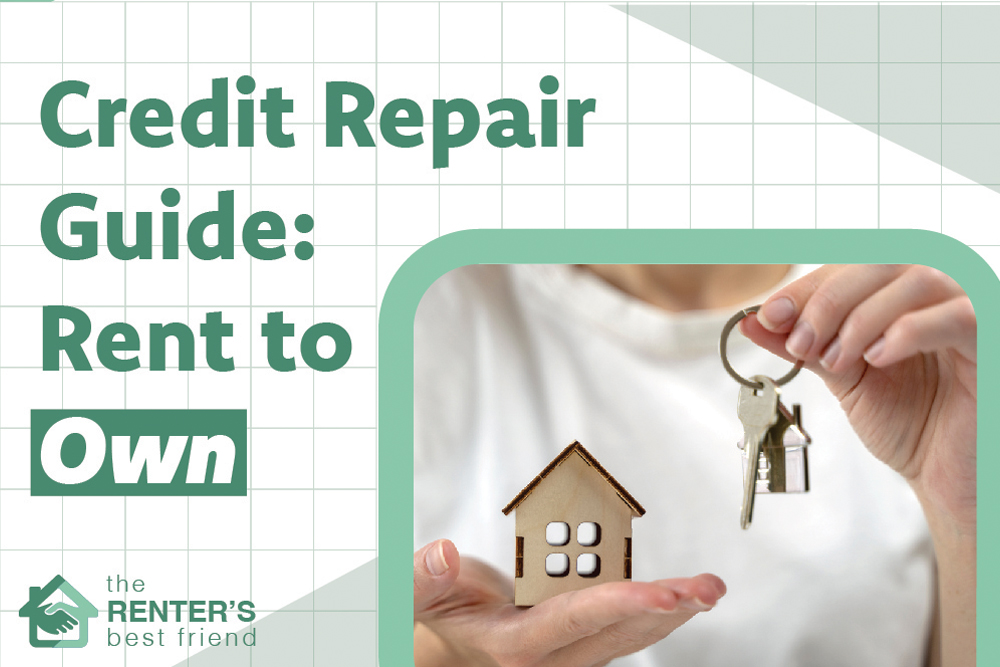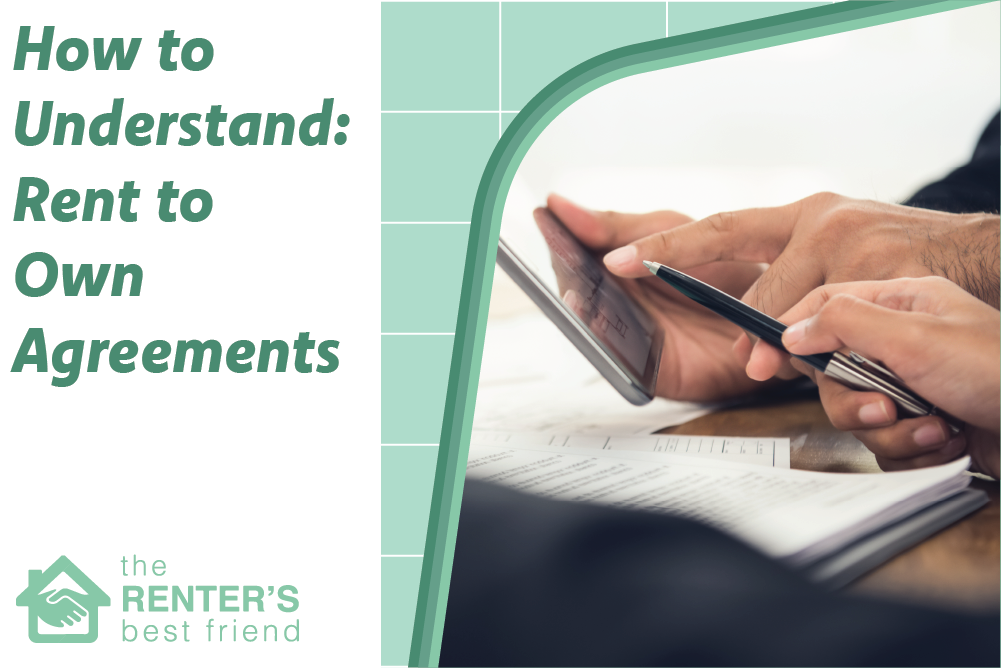Of the many ways that having bad credit can impact your life, the ability to secure a rent-to-own property is one of the largest. Don’t worry, however, there are steps you can take to reverse the situation you may find yourself in and begin your journey back towards having good credit.
Credit Repair Guide for Rent to Own Homes
Understanding why it is important and the process of repairing your credit is vital, even if some of the steps below may not apply to your current situation. The first step in this journey is to know what you current credit score is, so click here to get yours. Use this guide to have better idea of how you can leverage the resources you have to improve your credit score using a rent to own home. Let’s get started.
Why Do Credit Scores Matter?
Companies or individuals offering properties for rent-to-own use credit scores to determine how likely you will be to pay what you owe them each month. Simply put, the higher your credit score is, the more confidence it gives potential landlords that you have established responsible credit behavior.
The lower your credit score, the more of a financial risk you appear to be. This could cause potential property owners to question whether they want to enter into an agreement with you in the first place.
Rent-to-Own While You Repair Your Credit
A rent-to-own program might be the right step for you if you need more time to repair your credit before you attempt to close on a house. Keep in mind that entering into a rent-to-own contract and paying on it does not work towards improving your credit score. However, this period could allow you to keep up-to-date on other payments, thus working toward improving your credit.
Some options for rent-to-own programs are:
- Purchasing a home with a guaranteed rental period through a third-party program.
- One-on-one, seller-financed options (instead of a traditional mortgage).
- The exclusive right for a buyer to purchase a home that they have rented for a set period of time.
- Potential leasing options that set aside a certain percentage of rent towards purchasing the home.
You could decide to pay down small debts or issues while settling into your rent-to-own contract. We’ll touch on the stages you can take to repair your credit in a moment.
If you decide that rent-to-own is right for you, there are a few things to consider. Make sure that you are working with a real estate expert that you trust and choose a reputable program that offers transparent contracts. There are unfortunately many scams that try to take advantage of people in rent-to-own situations, so be vigilant for warning signs and never be afraid to walk away from an agreement that you do not fully trust.
What Exactly is Credit Repair Anyways?
In the most basic terms, credit repair is any method a consumer uses to improve their credit score. Some entries that reflect poorly on your credit score could be erroneous. According to some studies, one in three consumers has at least one error on their credit reports.
Every person is granted the right to a fair, accurate, and fully substantiated credit report under the Fair Credit Reporting Act. Acquiring one should be the first crucial step in repairing your credit. Disputing invalid entries on your report with the credit bureaus is completely free. Repairing your credit on your own is possible, but many people either do not have the time or don’t understand how to make their case.
In instances like this, it could be better to hire a credit repair professional to handle your particular dispute. They have been through the motions of filing potential disputes before and likely know what to look for.
Unfortunately, there are scammers in this industry as well, so make sure to thoroughly vet any company you are considering hiring. Avoid companies or individuals who claim that they can remove accurate or verified information from your credit report, and only work with a legitimate credit repair company.
How to Repair Your Credit in 5 Steps
-
Determine Your Current Score
Before you can repair your credit, you need to discover what is negatively impacting your score currently. Financial data is usually collected by the three big credit reporting agencies – Equifax®, Experian™, and TransUnion®. That data is then fed into an algorithm by a credit scoring company to generate a credit score. The two companies used almost universally for this are FICO® and VantageScore®.
While there are many different things that determine your score, the entries below are listed in order of “most” to “least” damaging:
- Bankruptcy
- Foreclosure
- Repossession
- Loan default
- Court judgments
- Collections
- Past due payments
- Late payments
- Credit rejections
- Credit inquiries
When you examine your credit report, you must be honest with yourself about what you see. It is possible that you might have missed payments. It happens to many people. To be able to move forward and repair your credit score, you will need to be realistic and truthful about your financial history in whatever condition it is in.
-
File Disputes Against Invalid Information
If you find any false information or inaccurate claims on your credit report, you are well within your rights to file a dispute. When this is done, the credit bureau is obliged to perform an investigation into the claim. If any information is found to be erroneous, then they have to re-examine (and possibly remove) those items from your credit report. In some cases, this could have a big impact on your credit report.
Because not all of the credit bureaus may contain the same entries, you will want to compile a separate, complete listing of all the invalid information present on each of their versions of your credit report. For each bureau where you find any false information, you need to send a 609 Dispute Letter asking for the information you think is wrong to be verified. Make certain that you send this with a return receipt request and be aware that it could take at least four weeks to process the dispute.
If there are any accounts on your credit report that you don’t recognize at all, it could be an indication of identity theft. Report these to the Federal Trade Commission immediately. If fraud protection is something that concerns you, credit monitoring services are offered by many credit card companies. You could also consider a freeze or a lock on your credit, which prevents anybody from being able to borrow against your credit.
As you go through this process, make certain to document your efforts to repair your credit. Stay organized. Keep copies of all the correspondence and mailing receipts that you have with the credit bureaus. Document each and every phone conversation you have with a credit reporting agency or creditor, and write down every detail – the name of the person who spoke with you, their title or position, their direct line or extension, the time and date, specifics of what was said, and what the agreement was. If the dispute drags out for longer than the 30 to 45 days specified by law, you may need to prove it. Having such detailed documentation could make all the difference in this situation.
-
Pay Down Outstanding Debts
This can be the most daunting step to undertake, but it is undoubtedly one of the most important moves on your journey to repair your credit. It could take months or years to accomplish, but once you pay off the debts that you owe, you can begin to build a healthier financial future. According to FICO®’s reporting, the amount of debt being carried accounts for nearly a third of your total credit score.
Consolidating debt can be a great way to pay down a bundle of debts simultaneously in a much more manageable way. By doing so, you can consolidate all of your bills into a single loan with only a single monthly payment. Make sure that you consider the interest rate of whatever new agreement you enter into carefully. It may also be a good idea to keep any credit cards you currently have open and unconsolidated, as the older your credit card accounts are the better they appear on your report. If you have a difficult time refraining from making impulse charges on your card, consider shredding or hiding the physical cards themselves and only using them in an emergency.
-
Adopt Better Financial Habits
Past mistakes may have placed your credit in jeopardy, but now is the time to learn from those mistakes. Establishing responsible financial habits will help you make absolutely certain that you do not find yourself in the same situation in the future.
- Make timely payments: This needs to be priority number one. It has the largest impact on your credit score.
- Keep low balances on credit cards: The amount of credit you have used when compared to your limit is called Credit Utilization. You want to keep that ratio below 30%. Pay down all or most of any hefty charges within a month of the purchase.
- Don’t borrow what you can’t pay back: Pay off your balances in full every month. It is imperative to avoid borrowing more money than you can pay back on time.
-
Building Back Up with New Credit
Once your credit score is in a more secure position, you can begin rebuilding a better financial foundation for your future. Your efforts will take time to bear fruit, but be confident in your diligence and the hard work that you have put in. Give your new accounts and strategies the time they need to appear on your credit reports. Patience and the continued habits of financial responsibility are the tools with which you will make your dream into your home.
If you decide that you want to hire a professional to help you repair your credit, click here to see what options are available to you.














